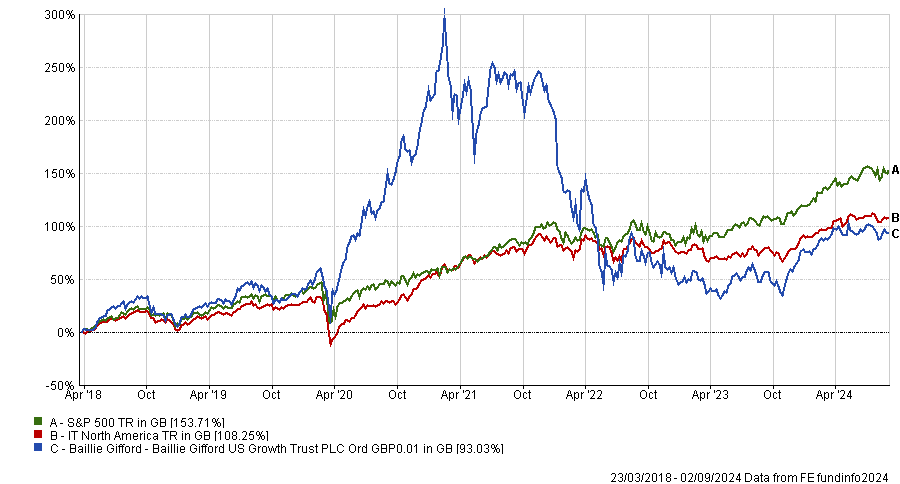Middling performance and a lack of “clear evidence” in the managers’ stock picking ability has led Investec head of investment companies research Alan Brierley and analyst Ben Newell to state the Baillie Gifford US Growth Trust “may have a problem”.
It comes after the trust, which has a market capitalisation of £568m, announced annual results for the year to the end of May, when the trust made a net asset value (NAV) return of 16.2% and a share price total return of 32.9%.
The chairman opened his statement by saying he was “pleased to report an improvement in performance”. Even if performance has turned a corner, the analysts warned that most of the positive returns over the past 12 months to the end of May came from just two stocks: Nvidia and SpaceX.
“Meanwhile, more than half of the quoted portfolio at the start of the year failed to produce a positive return,” said Brierley.
This led the Investec analysts to suggest the chairman’s stance was a “decidedly glass-half-full take on things”. Indeed, Baillie Gifford US Growth suffered severe losses in 2021 and 2022 and, although the recent uptick is welcome, it has not been enough to arrest the prior poor performance, as the below chart shows.
Performance of trust vs sector and benchmark since launch

Source: FE Analytics
Below Trustnet rounds up the main issues the Investec analysts had with the trust.
Discount narrowing – too little, too late?
The latest results were not all bad news. The discount narrowed from 22.4% to 11.2%, something the Investec analysts said was a “welcome development”.
“This was attributed to improved sentiment towards growth and the broader investment trust sector, although we note the weighted average discount of equity investment trusts only narrowed from 12.1% to 11.2%,” they said.
Yet they were concerned that the trust may have left its share buyback program too late. Indeed, in May 2022 the board bought back 0.7% of the company’s shares in two weeks but stated it was not in the best interests of shareholders to repurchase more.
It has changed its tune this year, stepping up its buyback programme in January, but the analysts said “it remains to be seen if this is too little, too late”.
Less favourable macroeconomics
The macroeconomic backdrop is not as favourable now as it has been. Although Federal Reserve chairman Jerome Powell has admitted the time has come for lower interest rates, this is unlikely to be the “panacea” that investors may be hoping for.
“We do not expect to see a return to a regime of low interest rates that has historically been so supportive of the [trust’s] philosophy,” they said.
Private problems
The trust follows many in the Baillie Gifford stable by taking full advantage of the structure to buy illiquid, unlisted companies. This has the potential to drive additional performance as these stocks can be the growth companies of the future. However, the analysts were not impressed by this part of the portfolio.
“Regarding the private company exposure (36% of NAV), this continues to be a drag on returns; we estimate that the total return in the past financial year was approximately 9%,” they said.
This is because late-stage venture capital has been undergoing a “price discovery process” following a rush of money into growth businesses during the Covid pandemic.
“We note that Baillie Gifford US Growth has significant exposure to these vintages, which account for 58% of the total exposure,” they added, noting this portion of the portfolio “appears heavily dependent on SpaceX”.
The managers
The trust aims to identify and invest in exceptional growth companies and managers Gary Robinson and Kirsty Gibson believe that the US remains a fertile hunting ground for growth investors.
Brierley and Newell noted that, by definition, there can only be a small number of exceptional companies and that it would be “churlish” to expect every name in the company’s portfolio to become the next big thing, but the managers aim to “find stocks that, when they win, they win big,” they said.
“However, at this point in time, there is still no clear evidence as yet as to whether this ambition can or will be fully realised,” the Investec analysts said.
“Performance is at least going back in the right direction again, but it still lags immediate benchmark comparators, and the portfolio has relied heavily on three very obvious listed names (Nvidia, Amazon and Netflix) to provide 61% of its returns for the year.”
Overall
Brierley and Newell retained a ‘hold’ recommendation on the trust despite the setbacks listed above. Part of the rationale was that, in their view, the US will continue to generate the best growth companies in the world.
“However, with little evidence of any tangible signs of any improvement, investors may increasingly begin to question whether a more balanced approach to growth is more appropriate,” they noted.





